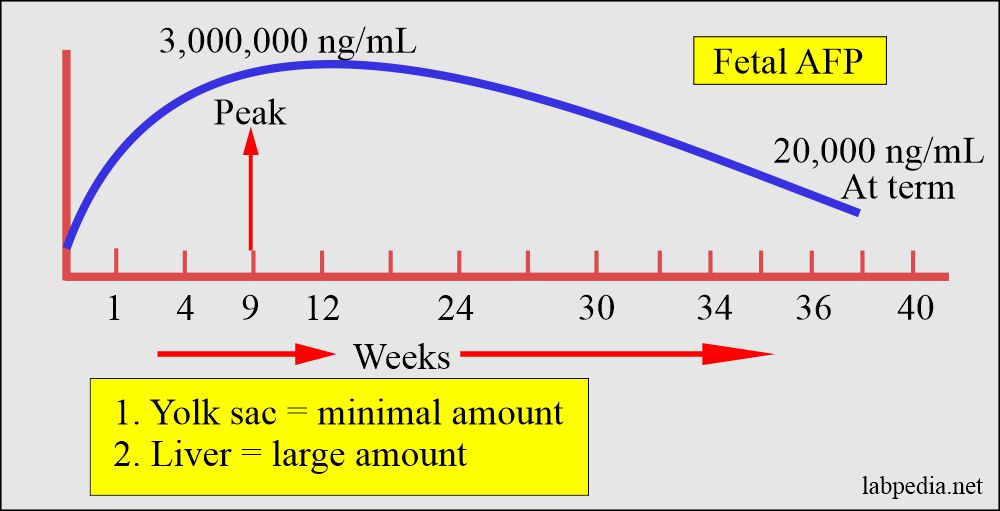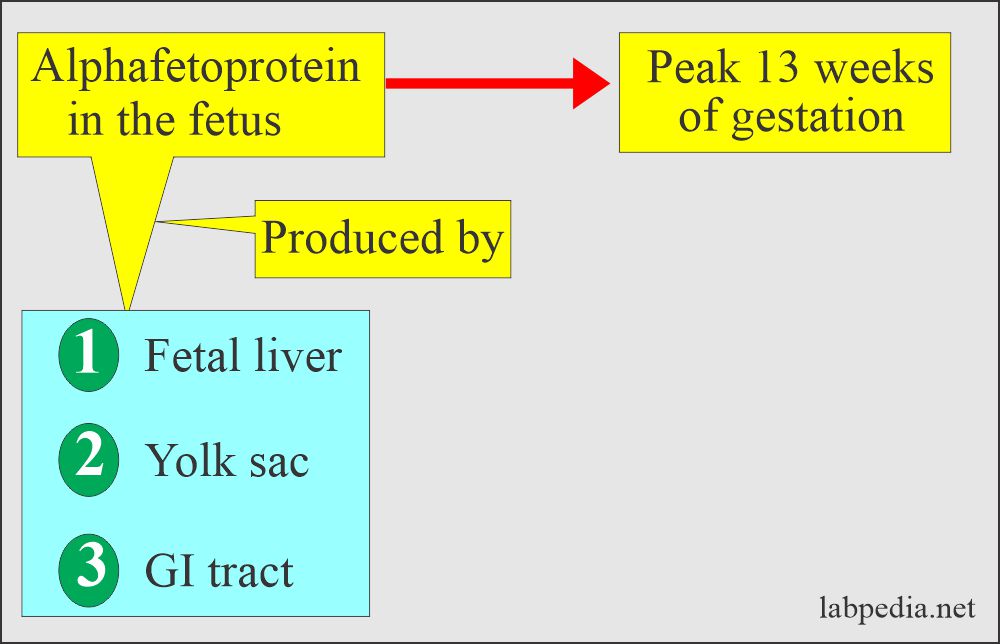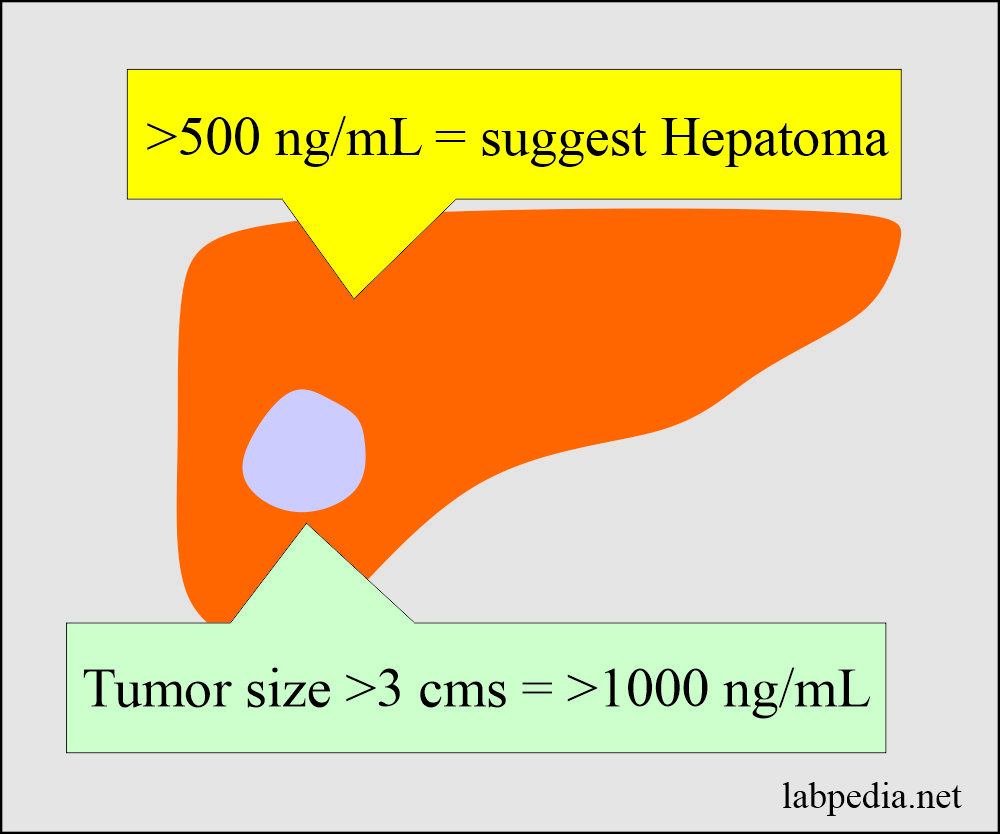Tumor Marker:- Part 8 – Alpha-Fetoprotein (AFP)
Alpha-Fetoprotein (AFP)
Sample for Alpha-Fetoprotein (AFP)
- The patient’s serum is needed.
- Can take a random sample, and no fasting is needed.
Indications for Alpha-Fetoprotein (AFP)
- For the diagnosis of liver cell carcinoma.
- Patients with chronic active hepatitis.
- Patients with cirrhosis and positive serology (HBV and HCV) should be tested with AFP and ultrasound abdomen.
- AFP is a tumor marker for yolk sac tumors.
- AFP raised in hepatoid gastric carcinoma.
Definition of Alpha-Fetoprotein (AFP)
- The discovery of oncofetal antigen AFP and CEA was made in 1960. This was the start of tumor markers.
- Alpha-Fetoprotein (AFP) was found in the serum of mice with liver cell carcinoma and later in the sera of humans with liver cell carcinoma.
- Alpha-Fetoprotein (AFP) is a tumor marker for liver cell carcinoma and germ cell (non-seminoma) carcinoma.
- This is a glycoprotein. This consists of a single polypeptide chain and has a 4% carbohydrate.
- The yolk sac produces this in small amounts and the liver with an abundant amount in the fetus.
- It is normal after about 18 months of birth.
- It is close to albumin, genetically and structurally.
- The gene coding for both is chromosome 4q.
- Its concentration is 10% of that of albumin.
Alpha-Fetoprotein (AFP) structure:
- The fetal liver produces an alpha-1 globulin called alpha-fetoprotein. It becomes the dominant fetal serum protein in the first trimester.
- It reaches a peak at 12 weeks, then declines to 1% of the peak at birth.
- By the age of 1 year, there is a marked decrease.
- Alpha-Fetoprotein (AFP) is a glycoprotein with a molecular weight of 70 kDa.
- It has a single polypeptide chain and around 5% of carbohydrates.
- Alpha-Fetoprotein (AFP) is synthesized in large quantities by the fetal yolk sac and liver during embryonic development.
- It is the major protein in fetal circulation.
- Alpha-Fetoprotein (AFP) is genetically and structurally identical to albumin.
The function of the Alpha-Fetoprotein (AFP)AFP:
- AFP has increased in pregnancy, usually not >100 ng/mL.
- Its main role is to bind and transport substances that are not water-soluble, like steroid hormones, lipids, vitamins, and bilirubin.
- Maternal serum AFP is lower than expected in Down’s syndrome.
- Maternal serum AFP is raised or higher level in the neural tube defect.
- A level> 1000 µg/L indicate malignancy:
- At this level, 50% of liver cell carcinomas are diagnosed.
- It is ideal for diagnosing a liver tumor below the size of 5 cm.
- To find these small tumors cut-off value has to be set at a lower level between 200 to 1000 µg/L.
- In healthy individuals is 10 µg/L.
Normal Alpha-Fetoprotein (AFP)
- Adult = <40 ng/mL (<40 µg/L)
- Child <1 year = <30 ng/mL
Another source
- 0 to 15 ng/mL
Alpha-Fetoprotein (AFP) tumor marker for:
Liver cell carcinoma.
- AFP is raised in 80% of liver cell carcinoma.
- >500 ng/mL is diagnostic of liver cell carcinoma.
- AFP may be raised for 18 months before the S/S appears.
- AFP is a sensitive indicator of recurrence.
- AFP >1000 ng/mL in 50% of the cases indicates tumor size >3 cm in diameter.
- In 90% of the cases, AFP >200 ng/mL, and 70% have a concentration of AFP >400 ng/mL.
- In 90% of cases of liver cell carcinoma Alpha-Fetoprotein (AFP) is raised >200 ng/mL.
- In 70% of the cases, liver cell carcinoma Alpha-Fetoprotein (AFP) is raised >400 ng/mL.
- In benign liver diseases, Alpha-Fetoprotein (AFP) rarely is >400 ng/mL.
- This is more likely raised in immature carcinoma than the mature type of carcinoma.
- An initial high level indicates a poor prognosis.
- Failure to come to normal indicates a problem with surgery where there is incomplete resection or metastasis.
- The postoperative decrease followed by an increase in the AFP indicates recurrence.
- If there is a short doubling in the AFP value, suggest metastasis at the time of surgery.
- AFP is useful for liver cell carcinoma:
- Diagnosing.
- Prognosis.
- Monitor therapy.
AFP is a tumor marker of the Germ cell tumor (nonseminomatous tumor):
- Yolk sac tumors lead to an increase in AFP, which correlates with the tumor prognosis; e.g., >1000 ng/mL is associated with a poor prognosis.
- Alpha-Fetoprotein (AFP) is raised in Embryonal cell carcinoma in 27% of the cases.
- Alpha-Fetoprotein (AFP) is raised in Malignant teratoma in 60% of the cases.
- Alpha-Fetoprotein (AFP) is increased in Testicular teratocarcinoma in 75% of the cases.
- Choriocarcinoma element is seen in seminoma, yolk sac, teratoma, and embryonal cell carcinoma.
- Pancreatic carcinoma AFP is positive in 23% of the cases.
- Gastric carcinoma AFP 18% positive.
- Bronchogenic carcinoma is 7% positive.
- Colon carcinoma is 5% positive.
Questions and answers:
Question 1: What is the level of Alpha-Fetoprotein (AFP) for the diagnosis of liver cell carcinoma?
Question 2: What is the relation of Alpha-Fetoprotein (AFP) to albumin?
- Note: In some books on the same page, the values are given in ng/mL and ng/dL. For me difficult to decide which one I can follow.



